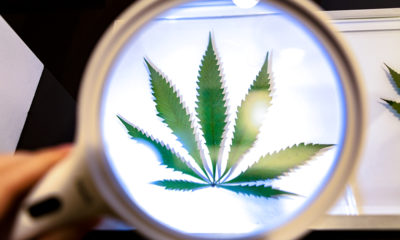
Medical
Study Finds Paternally Passed-Down ‘Stoner Gene’ in Rats with Human Implications
Research found rats exposed to cannabis passed on traits to their offspring — and they weren’t exactly positive.
Pregnant women are advised not to use cannabis, an increasingly common proscription that repeats itself every few news cycles in the marijuana legalization era.
The general reason why is obvious enough. It’s the same reason why a pregnant mother is advised not to smoke cigarettes and to eat well: Her intake can, and probably will, affect her baby.
But what if the same were true for the father? What if paternal cannabis intake had something to do with developments, good and ill, in the resulting offspring?
According to a study published April 24 in the journal Neurotoxicology and Teratology, paternal cannabis intake can lead to developments in offspring — and not all of them good.
Researchers at Duke University Medical Center gave adult male rats up to 2 milligrams of THC per kilogram of body weight over a 12-day period. (Prior research found that adult male rats exposed to that much THC could experience sperm alterations in the form of an additional methyl group; this phenomenon has also been found in adult human males.)
The rats’ offspring appeared perfectly healthy, for the most part. They were intact, clocked in at the right weight — but then, something went wrong with their development.
The researchers subjected the adult rats whose fathers consumed cannabis to a battery of tests. They did all the typical lab rat things: They ran a maze and they pressed levers in response to various stimuli, like a light cue.
The rats whose male parents were exposed to THC reduced their “habituation of locomotor activity” — which is a fancy researcher term for “the rats stopped moving as much.” The sons of stoner rats also saw “long-lasting significant impairment in attentional performance,” according to the researchers.
“This study shows that premating paternal THC exposure, even at a modest dose for a brief period, can cause deleterious long-term behavioral effects in the offspring, notably significant impairment in an operant attention task,” the researchers wrote. “These behavioral effects of paternal THC were still seen in the offspring when they became adults.”
In other words: The adult rats could go on a cannabis bender without issue, or at least without risk to themselves. But their offspring paid a price, with symptoms consistent with what we would diagnose as ADD, were the rats human, according to the researchers.
You may ask yourself: How much value is this study? What does a rat brain have to do with a human brain? These are fair questions, and the answers demonstrate why rats frequently serve as test subjects. Rat brains respond to stimuli and developments like Alzheimer’s in a way similar to humans, partially because rats and humans share evolutionary lineage.
That particular intake in this experiment — 2 milligrams of THC per kilogram of body weight — is not insignificant, either. If a human male weighs 180 pounds, he’s about 81 kilograms. Not every human male of that size consumes 162 milligrams of THC per day, but considering there are 1,000 milligrams in a gram, and a gram-sized joint of cannabis at 20% strength has 200 milligrams, there are more than a few adult human males whose cannabis intake matches or far exceeds the rats’.
At the same time, the rats’ THC solution wasn’t alcohol-free: the THC administered was 10% ethanol. The researchers did admit there’s a possibility, although it’s not a particularly likely one, that there was some strange reaction between that level of alcohol and the cannabis, but they could not be sure.
While the researchers acknowledge that more work on the subject is necessary, the study is consistent with other findings that show cannabis consumption does spur some change in sperm in males of reproductive age.
And it should give any human fathers-to-be something to at least think about prior to conceiving a child.
TELL US, do you ever think about how your cannabis consumption might affect your descendants?






















